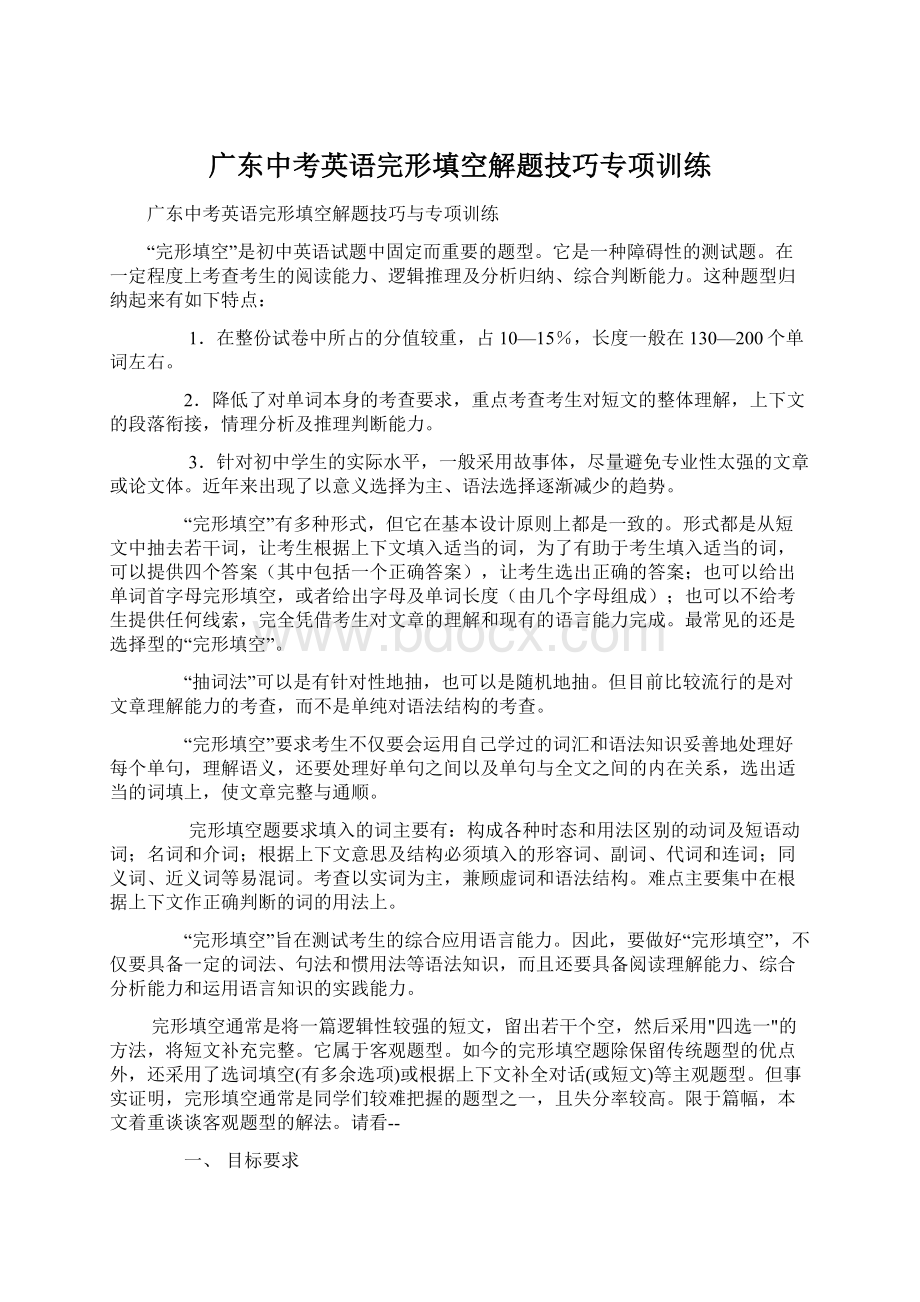广东中考英语完形填空解题技巧专项训练Word文档下载推荐.docx
《广东中考英语完形填空解题技巧专项训练Word文档下载推荐.docx》由会员分享,可在线阅读,更多相关《广东中考英语完形填空解题技巧专项训练Word文档下载推荐.docx(15页珍藏版)》请在冰豆网上搜索。

难点主要集中在根据上下文作正确判断的词的用法上。
“完形填空”旨在测试考生的综合应用语言能力。
因此,要做好“完形填空”,不仅要具备一定的词法、句法和惯用法等语法知识,而且还要具备阅读理解能力、综合分析能力和运用语言知识的实践能力。
完形填空通常是将一篇逻辑性较强的短文,留出若干个空,然后采用"
四选一"
的方法,将短文补充完整。
它属于客观题型。
如今的完形填空题除保留传统题型的优点外,还采用了选词填空(有多余选项)或根据上下文补全对话(或短文)等主观题型。
但事实证明,完形填空通常是同学们较难把握的题型之一,且失分率较高。
限于篇幅,本文着重谈谈客观题型的解法。
请看--
一、目标要求
完形填空主要测试学生在具体语言环境中对文章的篇章结构、中心思想、推理判断、词语辨析、习惯用法、固定搭配等方面的能力要求,及对所学英语的综合运用能力、快速阅读理解能力及逻辑推理判断能力等。
二、解题步骤
在做完形填空题时,通常先弄清语境,并依据上下文进行合理的分析、判断,才能作出恰当的选择。
具体可分为以下三步:
1.通览全文,了解大意
答题时,应先越过空档,通读全文,理顺题意,找出信息词。
这是做好完形填空题的关键。
因为完形填空的特点是着眼于整体理解。
我们如果把短文比作环环相扣的链条,那么由于空格的设置,"
链条"
从第二句起有些地方就脱节了。
有些同学习惯于提笔就填或边读边填,急于求成,然而,欲速则不达,结果往往由于"
只见树木不见森林"
而事倍功半。
因此我们应该依据首句给的启示,通过逻辑思维,借助短文中关键词所提供的信息,越过空档,尽快把全文读完,建立语言的整体感,帮助我们了解短文大意。
2.综合考虑,先易后难
通览全文后,认真观察选项,瞻前顾后,仔细推敲,逐项选定。
经过通读全文,对短文有了整体印象。
在此基础上,可以根据全文大意,展开逻辑思维,分析这一空格处在句中的地位,前后的关系和它所起的作用,确定最佳答案。
遇到困难,暂放一边,先易后难,这是解题之道。
当遇到难以判断的空档时,不妨先放一边,继续往下做。
因为有些答案是必须通过下文的理解后才能作出断定的。
有时,前后信息之间还有相互提示作用。
因此,当我们遇到难题时,不能久久停留于此,这样会浪费不必要的时间。
3.复读检验,消除疏漏
完成所有空档后,还要再次通读全文,看看这时的短文行文是否流畅,意义是否连贯,逻辑关系是否合理。
复查时,可从语法入手,检查一下句子的时态、主谓一致、代词的性、数、格以及词语的搭配等是否正确。
凡遇疑点,必须根据文章的中心思想,从意义、语法的角度来仔细权衡,加以改正,弥补疏漏。
三、实例点拨
请根据下面短文内容,在短文后面的四个选项中选择一个能填入空白处的最佳答案。
EveryyearstudentsinmanycountrieslearnEnglish.Someofthesestudentsarechildren,__1__studentsareyoungpeople.Whydoallthesepeoplewanttolearn__2__?
Itisnot__3__toanswerthisquestion.ManyboysandgirlslearnEnglishatschool.Itisoneoftheir__4__.ManypeoplelearnEnglishbecauseitis__5__intheirwork.SomeyoungpeoplelearnEnglish__6__theirhigherstudiesbecausesomeoftheirbooksare__7__English.OtherpeoplelearnEnglishbecausetheywantto__8__newspapersinEnglish.SomepeoplelearnEnglishbecausetheywantto__9__intheUSA,EnglandorAustralia.Englishisvery__10__inourlife(生活).
1.A.allB.theother C.bothD.other
2.A.EnglishB.Chinese C.mathsD.Japanese
3.A.hardB.easyC.goodD.nice
4.A.booksB.classes C.schoolsD.subjects(科目)
5.A.goodB.useful(有用的) C.fineD.pleased
6.A.forB.ofC.toD.from
7.A.inB.withC.atD.of
8.A.lookB.seeC.lookatD.read
9.A.goB.workC.likeD.come
10.A.helpB.helping C.helpsD.helpful
答题分三步:
第一步:
通览全文
通过通览全文,便知本文讲述许多人学习英语。
学习英语的人年龄不同,目的各异。
第二步:
逐项填空
本着先易后难的原则,先根据上下文和自己的语感,推测部分空格的可能答案。
然后,再结合选项逐一敲定。
1.选B。
some...other(s)...意思是"
一些……另一些(泛指)"
;
some...theother(s)...意思是"
一些……另一些(特指)"
。
由语境可知,在学英语的学生中,除一部分是孩子外,剩余的是青年人(特指)。
2.选A。
根据上下文可知是English。
3.选B。
由文章内容来看,人们学习英语的原因多种多样,因此回答为什么那么多人学习英语这个问题并不容易。
4.选D。
由常识可知,English是学生学习的科目(subject)之一。
5.选B。
根据前后文意可知许多人学习英语,那是因为English在他们的工作中很有用(useful)。
6.选A。
本题属于介词用法辨析。
介词for在此可表示目的、原因。
7.选A。
inEnglish是习惯搭配。
8.选D。
"
读报"
英语习惯说read newspapers。
9.选B。
根据语境及句子结构,有些人学习英语或想出国(gotoacountry)或想在这些国家工作(workinacountry)。
10.选D。
末句点题,"
英语在我们生活中是很有帮助的(helpful)"
第三步:
复读检验
将所有答案代入空格后,重新将短文复读一遍,如果语句通顺,语意清楚,便结束本题,转做其它试题。
最后须提醒大家一点,做好完形填空题并非一日之功。
我们应从平日学习中做起,多积累,勤学苦练,方可成功!
Haveagreatersuccessinthefuture!
(1)
Alicehadanargumentwithherbestfriend,JudylastThursday.Shethought41wasreallydifficultandwantedtocopyJudy’shomework.Butsherefused.Theydidn’ttalktoeachotherforafewdays.Alicedidn’tknow42tofacehermathsproblemandshewonderedifshecouldgetonwellwithherfriendagain.
Yesterdayafternoon,shesawacoolboy43theviolinhappilybytheroadwhenshewaswalkinghomefromschool.Theviolinmusicsoundedsonicethatshecouldn’thelpstoppingtolistentohim.44Alicedidn’tknowwhatmusichewasplaying,itmadeherfeelbetter.Afterhefinishedthemusic,Alicewalkedovertohimandsaid,“Thankyou45yourbeautifulmusic.Itgetsmeoutofthereallybadmood(心情).”Thenshetookoutsome46andgaveittohim.Tohersurprise,theboyaskedhertotakethemoneyback.Heexplainedthathewasn’tmakingmoneybyplayingtheviolin.Hejustwantedto47others.Hehopedthatthewonderfulmusiccouldmakepeoplerelaxedandhappy.That’swhyheplayeditbytheroad.Whata48boyhewas!
ThenAlicetoldhimabouthertrouble.
Hesaid,“Youshouldlearntosmileevenifyouareindifficulty.Listeningtomusicishelpful.Sowhynotlistentomusicas49aspossible?
Neverloseheart!
Believeinyourfriend!
Shehasherreason.Believein50!
Everythingwillgowell!
Hearingthesewords,Alicewenthomewithasmile.Shebelievedshecouldmakeit.
()41.A.ChineseB.mathsC.scienceD.physics
()42.A.whyB.howC.whenD.where
()43.A.carryingB.sellingC.buyingD.playing
()44.A.BecauseB.WhenC.ThoughD.Whether
()45.A.forB.withC.fromD.except
()46.A.musicB.moneyC.foodD.work
()47.A.haveB.leaveC.giveD.help
()48.A.tallB.richC.kindD.safe
()49.A.oftenB.quicklyC.soonD.loudly
()50.A.myselfB.herselfC.yourselfD.himself
(2)
Thesedays,somemiddleschoolsinChinaaretryingtodosomethingdifferent.
Thestudentschooseclassesaccordingtotheirownneeds.Foreachsubject,theycanmakeachoicefromdifferentlevels(等级)ofdifficulty.Soinsteadofstayinginthe
41
classroom,theygotodifferentroomstohavetheirlessons.Andtheteachersmakespecialteachingplansfor
42
.
Therearedifferentopinionsaboutit.
XiaRui,a13-year-oldgirl,said,“Ireallyloveit.Ithinkit’snicethatwecan
43
classesbyourselves.MyEnglishispoor.Iusedtobeafraidtoanswerquestionsinclass.Ithinkthatthegoodstudentsmay
44
mewhenImakemistakes.NowIfeelmuchmorerelaxed.”
ButherclassmateChenGangdidn’tagree.“Idon’tthinkitissogood
45
itisdifficultforstudentstofindwheretheclassroomsare,”hesaid.“Duringthebreak,studentscanbeseenhereandthere,runningandshoutingtofindtheir
46
.”
“I’mworriedthatsomestudentsmaythinktheyareinthelowerclass
47
loseinterestedinthesubject,”theirmathteacher,Mr.Wangsaid.“Ialso
48
thatsomeparentsmayfeelunhappyiftheirkidsstudyasubjectataneasylevel.”
“Inmyeyes,itisgood
49
bothstudentsandteachers,’Mr.Wangalsosaid.“Asteachers,wecanmaketeachingplansmore
50
andthestudentswilldevelopbetter.”
41.A.clean
B.same
C.bright
D.empty
42.A.us
B.him
C.them
D.you
43.A.play
B.teach
C.choose
D.work
44.A.laughat
B.listento
C.lookafter
D.waitfor
45.A.whether
B.because
C.when
D.before
46.A.parents
B.friends
C.books
D.classrooms
47.A.and
B.but
C.till
D.or
48.A.hope
B.report
C.cry
D.worry
49.A.for
B.at
C.on
D.with
50.A.slowly
B.easily
C.quietly
D.brightly
(3)
Thepopulationproblemmaybethe
1
oneoftheworldtoday.Theworld'
spopulationisgrowing
2
.Twothousandyearsago,therewereonly250millionpeople
3
theearth.Fourhundredyearsago,thenumberwas
4
500million.Butatthebeginningofthe
5
century,theworld'
spopulationwasabout1,700million.In1970,thisnumberwas3,600million.In1990,thenumberwasfivebillion.A
6
reportsaysthattheworldpopulationwill
7
sixbillionbytheendofthe20thcentury.Thisisjustten
8
afterit
9
fivebillion.Peoplesaythatbytheyear2010,
0
maybesevenbillion.
1.A.greatB.greaterC.greatestD.greating
2.A.fasterandfasterB.fastandfast
C.fastestandfastestD.fasterandfast
3.A.inB.onC.atD.for
4.A.nearlyB.moreC.almostD.over
5.A.twentyB.twelveC.twentiethD.twelfth
6.A.USAB.UNC.PRCD.PLA
7.A.pastB.passC.passedD.passes
8.A.weeksB.monthsC.seasonsD.years
9.A.getB.getsC.reachedD.reach
10.A.thisB.itsC.oneD.it
(4)
Firecanhelppeopleinmanyways.Butitcanalsobeveryharmful(有害的).Firecankeepyourhouse__1__,givelightandcookfood.Butfirecanburnthings__2__.Bigfirecanburn,trees,houses,animalsorpeople.
Nobodyknowshowpeoplebegantousefire.Butthereare__3__.interestingoldstoriesabouthowamanorwomanstartedafire.Oneis__4__aman.Theman__5__averylongtimeago.Hewentupthesunand__6__firedown.
Todaypeopleknowhowtomakeafirewithmatches(火柴).Childrensometimes__7__toplaywiththem.Butmatchescanbeverydangerous.Onematchcanburnapieceofpaper.and__8__itcouldburnahouse.Asmallfirecanturnabigfire.veryquickly.Soyou__9__becarefulwithmatches.
Becarefulwithfire,anditwill__10__you.Butifyouaren’tcarefulwithfire.anditmayhurtyou.
1.A.warm
B.warmer C.cool
D.cooler
2.A.also
B.too C.either
D.neither
3.A.many
B.much C.little
D.no
4.A.over
B.about C.alittle
D.